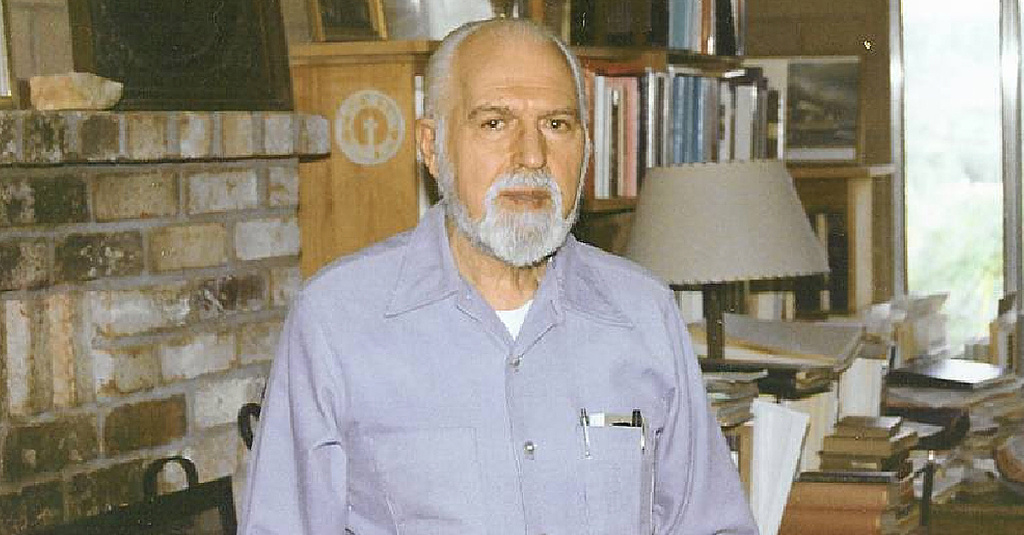
Rushdoony’s Commentary on Paul’s Letters to the Corinthians
We are soon to go to press with a long-awaited commentary by R. J. Rushdoony on Paul’s letters to the Corinthians, and the end product will be worth the wait. It’s titled, Sermons in First and Second Corinthians.

- Chalcedon Editorial
We are soon to go to press with a long-awaited commentary by R. J. Rushdoony on Paul’s letters to the Corinthians, and the end product will be worth the wait. It’s titled, Sermons in First and Second Corinthians.
Each new book that we publish—as well each book we republish—represents a long, tedious process of typing from handwritten manuscripts, indexing, proofing, along with page layout and cover design. There are several players in this process, and a great deal of time invested, but we feel we’re publishing volumes that will have a long “shelf life.”
Painstaking Work
We are also producing ebook versions as well as audio versions (see the cover story from the April issue of the Chalcedon Report) which means we’re making Rushdoony’s books more accessible than ever before, and that means greater influence!
As you know, Rushdoony wrote several commentaries on both Old and New Testament books, and we’ve yet to publish all of them. At present, we are also soon to publish Rushdoony’s Sermons in Zephaniah, Haggai, and Zechariah.
Part of the reason for the length of time needed to produce these volumes is the painstaking scholarship required to review the text and make it ready for publication. This is being done by our resident scholar, Martin Selbrede, whose technical readings are putting the brakes on several publishing projects because of the “jot and tittle” errors he finds which will make for even better books. When it comes to more academic books, you have to do your utmost to ensure both the text and the footnotes are reviewed and proofed carefully. We are grateful for Martin’s work in this area and doubly so because he’s currently serving Chalcedon on a part-time basis. He’s also the vice-president of Chalcedon, so we lean on Martin a great deal. And one more thing: Martin wrote the foreword to this new commentary!
Moved to Faith and Action
Rushdoony’s work on Paul’s letters to the Corinthians represented one of the last writing projects before he went to be with the Lord. As he’d done previously, his writing was derived from his sermons on the letters with the text reworked after he received questions. The end result is another great commentary where one will be encouraged to faith and action. Martin writes in his foreword:
For Dr. Rushdoony, the traditional resources he used (commentaries by Hodge, Godet, Grosheide, Morris, Conzelmann, Lenski, Evans, and Thrall) serve merely as the starting point for discussion. They simply anchor the vigorous application that Dr. Rushdoony extracts from the writings of the Apostle Paul for our era.
The sermon series Rushdoony delivered on Paul’s letters to the Corinthians is entitled Godly Social Order, which highlights once again Rush’s unwavering commitment to the Kingdom of God being manifest in every sphere of life. That same sermon series continued into Rush’s exposition of First John without losing his thesis. Without neglecting the clear emphasis upon the organized church, Rushdoony points us to the wider application of the faith for all of life. After all, the church itself is an embassy for the Kingdom of God, so no doubt Paul himself was preparing his churches for historical victory. Once again, we cite from Martin’s foreword:
Awareness of Dr. Rushdoony’s purpose in preparing these lessons helps guide and shape our understanding of these important passages of Scripture. We will come to realize that Dr. Rushdoony is right: that Paul isn’t so much interested in godly ecclesiastical order but something much bigger, something that embraces ecclesiastical order as just one element of many. Godly Social Order is indeed the right term to use, and it does apply to the Corinthian letters exposited here, as well as to First John.
The Marks of Maturity
In similar fashion, the mission of Chalcedon is the reinforcing of a godly social order, and although we pray continually for the organized church, our great concern is the firstness of the Kingdom of God. Whether it’s a small child, a denomination, a school, or an entire nation, it is the coming of the Kingdom that matters most.
However, it’s this larger vision of the Kingdom of God which provides greater meaning to the details of how we organize and operate in church, family, or state, yet the opposite is often the case: we as the church are caught up in lesser matters while leaving the greater matters untouched. This is not maturity, as Martin describes:
Christians who are able to follow Dr. Rushdoony as he traces St. Paul’s thoughts in these two massive epistles will be all the stronger for it, and will be able to “put away childish things,” the childish things today’s church clings to at its own peril.
The apostle Paul desired maturity for his congregations because he saw the forces of darkness arrayed against a struggling early church—a church which was to become light to the world. In Rushdoony’s discussion of 1 Corinthians 11, he writes:
The breakdown of the Greco-Roman culture was leading to a decay of standards in all areas of life and thought. The old order was not unlike what twentieth-century leaders envision as a new world order! Thus, the entrance of Christianity into such a world scene was most significant. The battle between the City of God and the city of man, the dream of Babel or Babylon, was joined. Over the centuries again and again the two cities have been in total war, one against the other. This is certainly true in our day. The relevance of Paul’s letter is very great.
Books are Ministry
This is how book publishing becomes important and why the mission of Chalcedon is vital for our time. We are not the sort of ministry which tries to track and speak to the ever-changing news cycle nor do we invest time and energy on the trending social issues.
The work of the Kingdom remains unchanged from Paul’s day to ours, which makes the letters of Paul relevant to our times, and that is Rushdoony’s approach to the Scriptures and the purpose of his writing. It is also our purpose as a ministry, and it’s why we feel that publishing and distributing Rushdoony’s materials is as crucial now as it was when he was with us.
For example, do you still peek at the pages of his Institutes of Biblical Law, or is that book irrelevant because it was published in the early 70s? Christians are still discovering the Institutes today and one cannot read it now without continually notice its relevance to today’s issues and problems.
More Than an Assembly
The church today is more than a local assembly or a classroom. It is the place where God meets with His people and they are further equipped to advance God’s Kingdom. In the first chapter of his commentary on First Corinthians, Rushdoony writes:
The Christian ecclesia was thus a body of men summoned out of the world to prepare themselves in Christ to govern the world by His law. The ecclesia was the church but more than a religious assembly. Every local group was a part of a universal realm, the Kingdom of God, not the Kingdom, but an aspect of its life. It is called together by God “in order to listen to, or to act for God.” The meaning of ecclesia is that it is a body of men called together for action in the name of God and according to His Word. The church is thus far more than a lecture hall. It is a training place for action for God’s Kingdom. With this in mind, we can see why Paul is distressed at the church’s sins and shortcomings.
Rushdoony was effective at highlighting the greater purpose of God’s Kingdom in order to help us avoid sappy pietism and a preoccupation with our own lives and congregations. Like Paul, Rushdoony calls us to faith and action, and his upcoming Sermons in First and Second Corinthians will push that thesis even further. Stay tuned for more information. We’re excited to announce its publication to you. Remember, it’s your support that makes all of this possible.

- Chalcedon Editorial